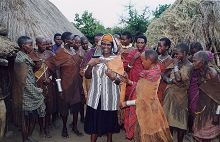Minneapolis, Mn-Neighbors and friends; reporters, local politicians and law enforcement streamed through the doors of Abubakar As-Sadique Mosque to interact with the Somali Community. The response to an open house invitation by the mosque was overwhelming. Media reports connecting the Minneapolis mosque to the Somali men alleged to have gone back to Somalia to fight Jihad, a holy war, have created new misconceptions about the community. For many guests that evening, learning about Islam and Muslims was refreshing for their knowledge of Islam was limited, and the little they knew was based on stereotypes.
The last several months have proved particularly difficult for the Somali community as they have fought rumors that their largest mosque-the Abubakar As-Sadique Mosque- has been indoctrinating and recruiting young Somali men to be terrorists.The open house is a move by the mosque’s leaders to dispel notions that the mosque is a “terrorist training ground”.
That evening, as guests walked into the mosque they were greeted by a warm “Welcome to our mosque,” and shown around by volunteers who encouraged them to ask many questions. There was a table with literature on Islam as well as English-translated Qurans, the Muslim holy book. Volunteers made sure that none of their guests were left unattended.
“This idea that Somalis refuse to talk to anyone is wrong,” lamented mosque board member, Abdirashid Abdi. He was responding to comments by reporters that members of the Somali community were hesitant to talk to the press. Abdi says that the mosque hopes to hold at least two community open houses every year.
Itasska Johnson, a Minneapolis Community Technical College student, was invited to the open house by a classmate. “I have been trying to get an insight into the community. My classmate emailed me one of their newsletters and invited me to this event,” she explained. Johnson had not heard about the missing Somali men, however, her sister on learning that Johnson was at a mosque was quick to inform her: “She asked me why I would come here when the news says that Somalis are bombing people.”
Toni Newborn, who was sharing a table with her, engaged her in a conversation on the recent news reports. Newborn works with the Minneapolis Department of Civil Rights, investigations unit and has given presentations at mosques. She has firsthand knowledge on the consequences of the negative media on the Somali community and was at the open house to show her support for the community.
Richfield High School teachers Dave Clark, Lindsay Peak and Laura Harris were invited to the open house by their students. “I want to be more informed,” said Peak who is a world studies teacher. About 50% of the schools ESL students are Somali and the teachers estimate that roughly 6 – 7% of the school’s population is Muslim. This was the first time all three had been to a mosque.
Social Science teacher, Laura Harris, had Muslim friends in college and teaches Muslim students, but thought she wasn’t allowed to go to the mosque. “This kind of interaction gives a better understanding than what is taught in class,” she remarked.
At 6:00pm the guests accompanied their hosts in the prayer hall for Islam sunset prayers know as Magharib. Volunteers explained the proceedings to the groups of people seated around them.
After the prayers, which lasted about 10 minutes, everyone headed for dinner and enjoyed an East African feast that included rice, chapatis, beef stew and samosas, all courtesy of Casablanca Restaurant.
Abubakar As-Sadique Mosque is more than a place of worship; it is also a community center. It has a wedding hall and runs social programs like elder arbitration to settle family and community disputes and has seasonal youth programs for education and fitness (done through the YMCA and YWCA). A school is under construction on the second floor.
Following dinner, the guests moved into the packed wedding hall to listen to community leaders address them.
“We are part of the Minnesota community, we are taxpayers, we are working for the good of the Minnesota society,” said Sheikh Abdirahman Ahmed, who is Abubakar’s Imam. He has lived in Minnesota for over ten years, was a counselor at Higher Ground Academy as well as a teacher at South Central High School. “We don’t want to harm anybody, we know what harm means, we came from a country with civil war,” he added.
“The mosque and this center are only for the service of Muslims in Minnesota,’ said mosque director Omar Hurre.
“Minnesota has been unique for Somalis. We have blended in over the last 10 years and built businesses, we are good citizens,” commented Axis Medical Center director, Dr. Abdirahman Mohamed.
“The great thing about America is that unless proven otherwise you are not guilty.” Dr. Mohamed has been highly critical of press reports that have branded the mosque as a terrorist training ground.
The Civil Rights Director of the Council on American Islamic Relations in Minnesota (CAIR-MN) Taneeza Islam passionately urged Somalis and other Muslims to exercise their freedom as Americans, “I want all of you here today to think of what’s happening in the Somali community as an American civil rights issue, as a Minnesota civil rights issue. Let’s empower each other and do it the American way.”







